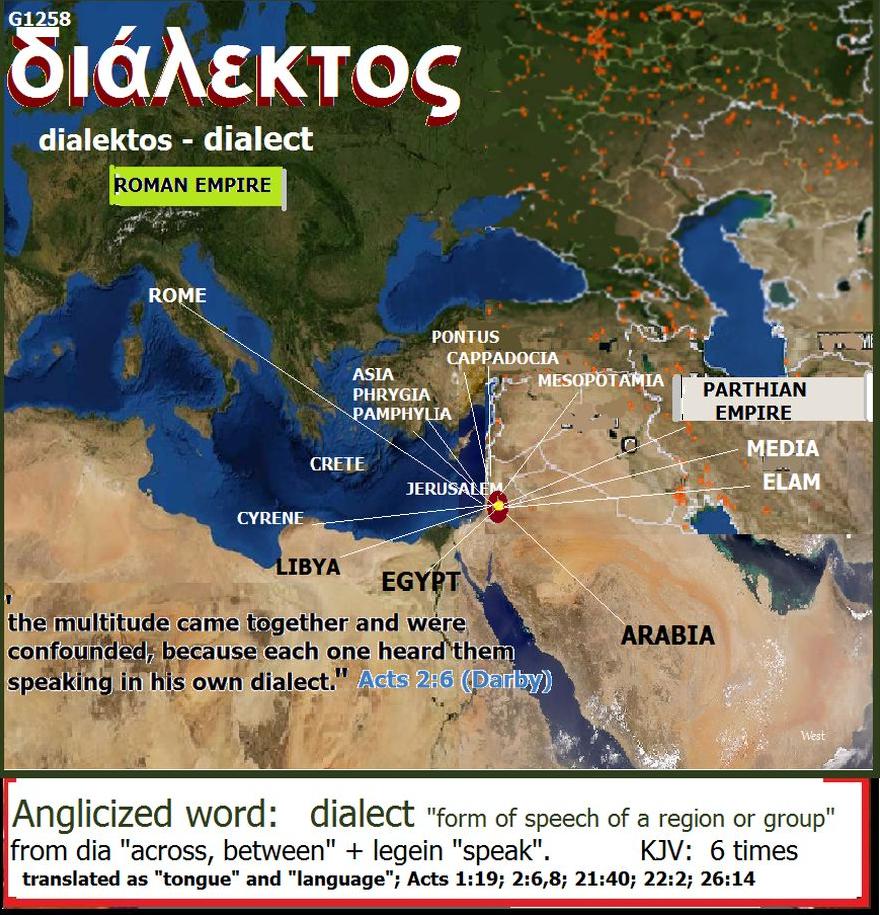
The tongues in Jerusalem at Pentecost - Acts 2
from: https://biblestudylessons.net/Comics/Greek%20to%20me/menu.html
TONGUES
AND DIALECTS
FROM
HEAVEN
Pentecost Sounds: #3
Acts
2
After 1800 years of silence, a religion claimed that Heaven again made that "phone call" to Earth like He did on Pentecost. This time the "baptism of the Holy Ghost" is reported to have been witnessed at Bethel College in Topeka, KS, on January 1, 1901. "She spoke in 'tongues' just like at the beginning (1800 years ago)."

The tongues in
Jerusalem at Pentecost - Acts 2
from: https://biblestudylessons.net/Comics/Greek%20to%20me/menu.html
Eighteen hundred years ago on Pentecost, God did make a "phone [Greek]" call to the apostles in Jerusalem which made such a blast that multitudes curiously hurried to where the apostles were. They heard the apostles speak to them in "tongues [Greek glossa; compare to our English 'glossary']."
This article is the third in our four part series on the miraculous sounds that occurred on Pentecost; we are looking at a third Greek word that describes to us the sounds phenomenon in Acts 2: "dialect."
"Now when this was noised [Greek: phone] abroad, the multitude came together, and were confounded, because that every man heard them speak in his own language [dialect]" (Acts 2:6, KJV). Darby's translation has "each one heard them speaking in his own dialect." This version anglicizes the Greek word used.
We know that the word "dialect" (language) is describing the tongues (glossa) of verse 4 because the writer quotes the audience as saying, (1) "And how hear we every man in our own tongue [dialect], wherein were born?" (verse 8); and (2) "Cretes and Arabians, we do hear them speak in our tongues [glossa] the wonderful works of God" (verse 11).
The English word "dialect" is from the Greek dialektosG1258, which according to Thayer's Dictionary means "1. conversation, speech, discourse, language; [or] 2. the tongue or language peculiar to any people." The book of Acts uses this word six times; the King James translates it as "language" (1 time, Acts 2:6) and "tongue" (5 times, Acts 1:19; 2:8; 21:40; 22:2; 26:14).
When Paul was arrested in Jerusalem and the multitude were confused as to whether Paul was a Gentile, Paul spoke to them in the Hebrew tongue (Acts 21:40). They became extra silent when they heard him speak in the Jewish sacred dialect. When Paul was met on the road to Damascus before his conversion, he heard the voice in the Hebrew tongue [dialect], "Saul, Saul, why persecutest thou me?" (Acts 26:14). Even the Hebrew language was identified as a dialect.
According the historian Josephus, Jews were living throughout both the Roman Empire (the west) and the Parthian Empire (to the east, from whence came the magi to visit the baby Jesus). People that represented all these countries were present in Jerusalem at this time.
Although devout Jews were taught the sacred Hebrew and probably knew the universal commerce language of Greek, their birth country would have its unique native language and phonetics. "And how hear we every man in our own tongue [dialect], wherein we were born? Parthians, and Medes, and Elamites, and the dwellers in Mesopotamia, and in Judaea, and Cappadocia, in Pontus, and Asia, Phrygia, and Pamphylia, in Egypt, and in the parts of Libya about Cyrene, and strangers of Rome, Jews and proselytes, Cretes and Arabians" (Acts 2:8-11a).
The audience observe that the speakers are all Galileans, that know no other than their mother tongue (Acts 2:7). Galileans spoke it with the north-country tone and dialect (Peter had been identified, "Thou art a Galilean, and thy speech betrays thee"-Matthew 26:72),
The facts of the original Pentecost "tongues" in Acts 2: (1) a sign to unbelievers (1 Corinthians 14:22) to attest to the authenticity of the message (Mark 16:18-20; see article #2); (2) a recognizable language on the earth; hence, an instrument to communicate meaning from humans to other humans and (3) it was unique in being identifiable as speech associated with a specific region (e.g., "New England" or "southern" talk). In a way, the dialect reminds us of the classic "My Fair Lady" and "Pygmalion" in which a Hungarian phonetics expert can identify the place where a person is from, simply by her speech pattern.
I'm from West Tennessee and I can tell and appreciate hearing a native speaker from there. Not only did the people understand the message about God's wonderful deeds, they were assured that it was from God because it was delivered by Galileans yet spoken in their own peculiar dialect.
The message was that God had confirmed Jesus as the promised Lord by signs and miracles. In spite of their killing Jesus, Jesus had been raised and made both Lord and Christ (the Messiah) and was sitting on His throne at the right hand of God. They were to repent of their sins and be baptized in water (Acts 10:47,48). This same message was consistently given throughout the book of Acts through tongues or prophecy (1 Corinthians 14:2,3). The use of tongues was limited to the audience's understanding (1 Corinthians 14:2,3; 15,16). This is consistent with Acts 2's defining of tongues as "regional dialects."
- Gaylon West
Throw Out the Lifeline
. . . . . . .BibleStudyLessons.net

|